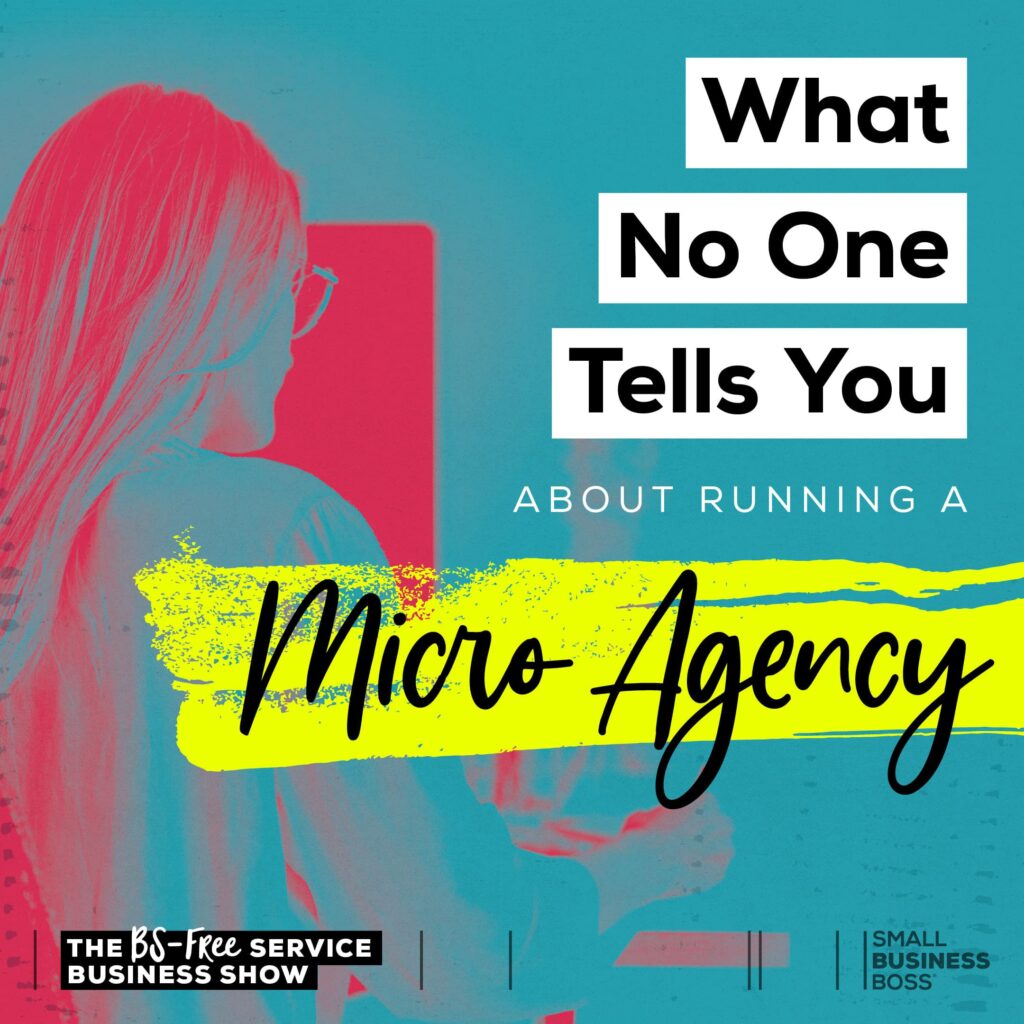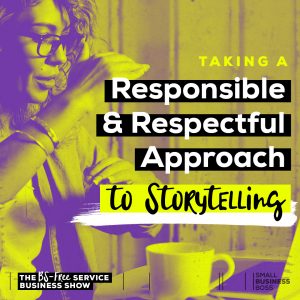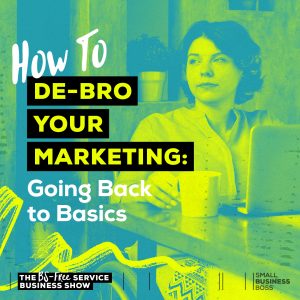
Search the site:
What No One Tells You About Running a Micro Agency
When you’re running a micro agency, you’re likely going to learn a lot of things along the way. Sometimes it’s surprising and other times you wonder if you’re completely unhinged because you’re learning things the hard way. No matter where you are in your journey as an agency owner, you’re going to want to listen to this episode as we delve into lessons and hard won wisdom from my journey as an agency owner.
Want to hear something that makes me laugh? When I see the ads on Instagram or Facebook that promise me I can scale my agency quickly and remove myself completely with one simple secret.
What a load of it. On the flip side, one of the reasons I didn’t want to start an agency for the first 11 years of my freelance career was that I’d worked in and with agencies and I was very clear on what I didn’t want. While I’d worked with some amazing humans, I didn’t want a big team or to be living “that agency life” like I was in my 20s and early 30s.
When I started my content marketing micro agency Scoop Studios in 2016, I had a lot of knowledge and experience going into it, but for the love of everything, there was still a learning curve.
This is probably why I’m such a big advocate of people making an intentional choice to become an agency owner versus accidentally falling into it. In fact, I work with many business owners who want to stay as solo business owners, and I’m fully supportive of this.
If you’re considering shifting into the agency model, this episode will give you some food for thought. And if you’re already in agency land, it’s designed to affirm that this is not a “you” problem and that you’re not alone.
Before we dive right into things people don’t tell you about running a micro agency, a quick reminder that a micro business, and by extension, a micro agency is a business with less than nine employees.
The distinction of a micro agency is critical to this episode as I’m not talking about challenges big agencies face. And I’m definitely not talking about it in terms of the crap taught about agencies in the online business world.
Now, let’s dive into my list of things no one tells you about running a micro agency.
You CAN Land Big Name Clients
I wanted to start off with a positive one, as I think so many times people think that a micro agency means you can only land small business clients. It’s not true.
With shifts in the market and a need for bigger companies to contain costs, big brand names are willing to engage micro agencies, particularly if they’re highly specialized. The days of them only being willing to work with big agencies are long gone.
They may not bring you in to handle their entire marketing program (because let’s be real, that’s not something you can likely handle) but they could bring you in to deal with thought leadership content or social video or a particular type of consulting.
The key is having a specific niche and being seen as an expert in a specific area. Plus, your relationships are typically what will bring you into bigger companies. For example, we had a few bigger clients over the years. In one case, that was because of a relationship with a former client landing at a big-name company. In another case, thanks to the power of SEO and thought leadership content.
That doesn’t mean you have to work with big-name clients, but I want you to know that it’s an option available to you. Even as a solo freelancer, I worked with some of the biggest brands in the world because of my relationships and expertise.
Capacity is a Never Ending Work in Progress
If I could invent anything for my clients, it would be a capacity-o-meter, as capacity is an ongoing focus. Even if you’re not struggling with it per se, it’s something you’re always calibrating and correcting as an agency owner.
Let’s be real; things change day-to-day in a micro agency. Every single client and team member results in a ripple impact (good or bad) on your capacity.
If you’re struggling with managing your capacity, I want you to know this is 100% normal. Countless inputs go into managing your agency’s capacity, and it can be hard to nail down accurate numbers. Unlike when you’re flying solo and can rely on gut feel, with your agency, you need some hard data to make decisions.
The easiest way to address capacity is to look at your supply of hours (team availability) and then your demand (aka client forecast). To do that at a minimum you need data from your team’s hours tracking, revenue forecasts, and a firm understanding of how that all works together week after week.
Truth? It’s never going to be perfect. I don’t trust anyone who claims to have this 100% figured out as it can change hour by hour. But that doesn’t mean you can’t get a firm grip on it by paying attention to your data.
Surprise: You’re a Leader Now!
Speaking of capacity, it’s complicated because when you’re a solo show, you’re just dealing with yourself. But with a team, you’re now juggling multiple people and projects and when it’s not quite right, you’re dealing with the fallout.
Welcome to being a leader. Because you’re ultimately responsible and unlikely when you’re solo and suffering the consequences of bad capacity planning, you get the rewards, but you also get the headaches.
This is the only reason I don’t want to see any more accidental agency owners. You need at least some idea of what you’re signing up for!
I know for myself, the agency owners I work with in the Agency Mastermind, and so many other agency owners I know the level of leadership you need can be unexpected. Before having my agency, I’d managed big agency teams on complex projects, but I still wasn’t fully prepared.
Honestly? No training or anything could have fully prepared me. But I wouldn’t change it. There are a lot of upsides to being a leader. If you’re an agency owner today, you know exactly what I’m talking about, and I want you to know that if you struggle as a leader, you’re not alone.
And if you’re a newer agency owner, or it’s something you’re thinking about, prepare yourself. I want you to know what running an agency is about. It’s not just hiring a bunch of people so you can make more money. It’s way more nuanced and layered than that.
Finally, I want you to know that you don’t have to lead like the CEO of a giant corporation. You don’t have to have it all together. You don’t have to have it all figured out.
You’re human. And that’s an asset for you as a leader. (And that’s something our leadership coach inside the Agency Mastermind has drilled into my head in my work with her.)
Hiring Can be a Huge Challenge
Do you know what makes me laugh? How people talk about hiring a team in the online business world is like it’s the easiest thing ever.
It is not. It’s a lie.
Especially here in 2022, with a shortage of roles and lots of competition to fill those roles. Then add that you’re competing with other agencies and companies for that talent.
And once you find that person, you need to spend weeks, maybe months, getting them up to speed. No new hire, even a skilled contractor, is ready to go a week or two in. There’s always way more learning curve.
Trust me on this. You could have amazing processes, and it will still take longer. Whatever you think, it will be 3x or maybe even 5x it.
Every time I hire, I’m reminded of this fact and have to manage my expectations.
Do I end up regretting hiring? Very rarely.
But getting someone integrated into your team, client work and systems is a process that takes time particularly if you need to build a lot of trust with them to hand off clients.
I love the team we’ve built, but I also would rather not have to hire anyone ever. But when you run an agency, it’s part of the deal.
The good news is, the more hiring you do, then eventually it gets easier. You get better at it, And you learn what you can really and truly expect.
You Probably Need to Charge More
Something I often see with micro agencies is that they’re undercharging. They’re pricing their services like the scrappy solo freelancer they likely started their business as.
It’s easy to think that as a micro agency, you don’t need to charge as much as bigger agencies, which is true. You don’t have the same overhead and hard costs of running your agency, but you have MORE of them than you do as a solo business owner.
That’s why you need to have a firm grip on the hard costs of your agency and what it costs to service your clients. I’m talking about super sexy metrics like gross project margin and effective billing rates.
And if you’re not convinced, I encourage you to look at what big agencies are charging for their most junior team members. When I was hired as an account coordinator in 1999, I was billed at $90/hour. When I left that role in 2005, my billing rate as an Account Director was close to $300/hour.
That’s like a million years ago. And if you own an agency, you’re at the same level of experience and skill I was as an Account Director.
To put this in perspective, I’m not saying that you should be charging $300/hour, but you definitely should NOT be charging like you’re the Account Coordinator fresh out of college.
For a little more context, Credo’s Digital Marketing Pricing Survey 2022 shares average rates for agencies on a worldwide basis:
- Average digital marketing provider hourly rate worldwide is $138.
- Average digital consultant hourly rate is $143.
- Average digital agency hourly rate is $137.94
Keep in mind this is worldwide data, so I suspect these rates are lower than reality for what we see in the North American market. As an agency, even if you don’t charge by the hour, you still need an hourly rate to work from, and that hourly rate needs not to be pricing like you’re a freelancer with little experience.
The final part is that you need to consider the role your pricing plays in your overall positioning in your market.
You don’t want to be winning new clients based on price. And you don’t want to look like you don’t know what you’re doing because you’re pricing too low, particularly if you’re coming up against bigger agencies.
Your Thought Leadership Matters
Speaking of competing against big agencies and getting clients, one of the hardest lessons I learned as an agency owner was that I couldn’t rely on referrals anymore.
When you have a team, and bigger revenue numbers, and also have more expenses. Which means you need more clients.
Now, if you have more leads, then you know what to do with…you can take a trip in your mind and ignore me for a moment here.
But if you want more leads or higher quality clients, you must work on your thought leadership. One of the easiest things for micro agency owners to do is focus on their client work and ignore marketing.
Your thought leadership matters on multiple fronts. First, if you want to compete against bigger players in your niche, you need to have a way to stand out, and your thought leadership is a key element of your overall brand.
Then, there’s the fact that you need to elevate yourself out of scrappy freelancer mode so you’re seen as the expert you are. You don’t want your potential clients comparing you to someone they can hire at a much lower rate. You want them to want to hire you and your team because you’re known for the thing you do.
What form that thought leadership takes is up to you, but you need to avoid falling into the trap of what my friend Michelle Mazur calls the overlooked expert.
This is exactly why I’m focusing on teaching more service business owners, especially agency owners, how to sell strategy.
The Realities of Running a Micro Agency
If you’re a micro agency owner, I hope that after today’s episode you feel less alone. The reality is that many things you encounter along the way are completely normal. That said, you don’t have to accept them and suffer. You have choices, and there are ways to refine, recalibrate and reset so running your agency is simpler and more sustainable.
Want more support? I encourage you to check out our podcast for micro agency owners and sign up below for my weekly newsletter.

I’m Maggie Patterson (she/her), and services businesses are my business.
I have 20+ years of experience with client services, am a consultant for agency owners, creatives, and consultants, and vocal advocate for humane business practices rooted in empathy, respect, and trust.
Read or Listen to the Latest
For Solo Business Owners

Growing a solo service business is tough.
It’s even harder when you’re bombarded with BS advice that steers you away from your values and why you started your business in the first place.
This is the podcast for solo creatives and consultants who want to remain as a team of one and have zero interest in the hustle and grind of typical business teachings.
Subscribe now and never miss an episode.
For Micro Agency Owners
Most podcasts for agency owners obsess over revenue growth as the ultimate success metric.

But here’s the truth: not everyone wants to make millions. Your goal might be to build a sustainable business that lets you have a life and doesn’t run you into the ground.
Join me as I spill my shameless confessions and share everything I’ve learned about building a micro agency that skips the BS of tired and typical agency teachings.
Follow Now on All Major Podcast Platforms








